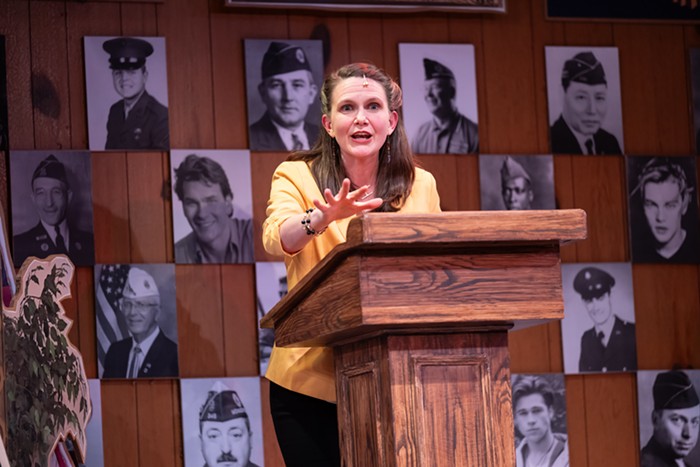And that's kind of what happens, but all by design. Bang. Curtain. End of Show. is simultaneously a celebration of melodrama and an exploration of what it means to be at the theatre--i.e. watching people play dress-up and act. The loose script, adapted from sources like Bluebeard & Irma Vep by Charles Ludlum and The Haunting of Hill House by Shirley Jackson, employs classic stock characters in the typical haunted castle/locked up love scenario. There's a villain, an ingenue, a hero, a fool, a maid and some minions. You get the idea.
Nothing about this show takes itself too seriously, from the constantly exposed accordion/keyboard accompanist who's always underfoot to the flimsy paperboard tree props occasionally littering the stage. Even the actors' direct meditations on the nature of performance, which they slip into and out of without warning, are goofy, albeit thought provoking.
The show basically mocks the notion of suspending disbelief. Once you realize that you'll feel a sense of relief that in turn will allow you to be swept up in the antics of entertainment. Actors leap on stage, singing a show-tune ditty announcing their arrival and literally beg for your attention. Sentiments like love, fear and sadness are distorted and then discounted. Actors break into bows and ensemble genuflects, often saying what they're really thinking instead of their lines. "I'm really a 24-year old girl," says one actor wearing a painted-on mustache. "Telling the truth is better than lying," says another.
By show's end the melodrama reaches a fervent pitch when the actress playing the ingenue decides to die and everyone grabs a script/blond wig to complete the show. Lines are supplied with abandon and lose all meaning. Chaos reigns, and in the wake of it all, the audience is left with musings on the illusion of reality. ANNA SIMON


















